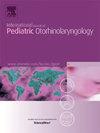Postoperative caregiver decision regret following velopharyngeal dysfunction surgery
IF 1.2
4区 医学
Q3 OTORHINOLARYNGOLOGY
International journal of pediatric otorhinolaryngology
Pub Date : 2025-04-11
DOI:10.1016/j.ijporl.2025.112348
引用次数: 0
Abstract
Background
Decision regret (DR) is a powerful factor in medical decision-making, particularly for surgical decisions which carry multiple risks, impact quality of life (QOL), and have uncertain outcomes. While prior studies have investigated caregiver DR after tonsillectomy and otologic surgery, there is a paucity of data assessing DR following pediatric otolaryngology procedures. The aim of this study is to measure DR following velopharyngeal dysfunction (VPD) surgery.
Methods
A cross-sectional survey study with chart review was performed of caregivers of children who had VPD surgery performed by a single surgeon at a tertiary children's hospital. Demographic, medical, and surgical history were collected. Surveys assessed postoperative DR (scale 0–100), satisfaction with surgery (0-10), caregiver engagement in decision making, and QOL using the VPI Effects on Life Outcomes (VELO)-parent instrument (0–100).
Results
Of 59 caregivers who received the survey, 27 (45.8 %) completed the surveys. Caregivers felt involved in the decision for surgery (85 %). Postoperative caregiver-reported QOL (mean 81.5) and satisfaction (mean 9.4) were overall high. DR was low (mean 4.4), with 22 caregivers (78.6 %) reporting zero DR. Compared to those with no regret, those with DR > 0 reported lower satisfaction (mean 9.7 vs 8.0, p = 0.002) and worse speech limitations (mean 81.2 vs 67.1, p = 0.015) or situational difficulty (mean 77.7 vs. 51.0, p < 0.001) on VELO subscales.
Conclusion
While DR was overall low following VPD surgery, presence of DR was associated with worse speech-related QOL. Further prospective and multi-institutional study of DR is needed in pediatric otolaryngology to identify predictors of regret and understand treatment outcomes.
腭咽功能障碍手术后护理人员决定后悔
决策后悔(decision regret, DR)是影响医疗决策的一个重要因素,特别是对于具有多重风险、影响生活质量(QOL)且结果不确定的手术决策。虽然先前的研究调查了扁桃体切除术和耳科手术后护理人员的DR,但缺乏评估儿科耳鼻喉科手术后DR的数据。本研究的目的是测量腭咽功能障碍(VPD)手术后的DR。方法对某三级儿童医院单外科手术患儿的护理人员进行横断面调查研究。收集了人口统计学、医学和手术史。调查评估了术后DR(评分0-100)、手术满意度(评分0-10)、护理人员参与决策以及使用VPI影响生命结局(VELO)-父母工具(评分0-100)的生活质量。结果接受调查的59名护理人员中,27名(45.8%)完成了调查。护理人员感觉参与了手术的决定(85%)。术后护理人员报告的生活质量(平均81.5)和满意度(平均9.4)总体较高。DR较低(平均4.4),22名护理人员(78.6%)报告无DR。0报告满意度较低(平均9.7 vs 8.0, p = 0.002),言语限制较差(平均81.2 vs 67.1, p = 0.015)或情境困难(平均77.7 vs 51.0, p <;0.001)。结论虽然VPD术后DR总体较低,但DR的存在与较差的言语相关生活质量相关。儿科耳鼻喉科需要进一步的前瞻性和多机构研究DR,以确定后悔的预测因素并了解治疗结果。
本文章由计算机程序翻译,如有差异,请以英文原文为准。
求助全文
约1分钟内获得全文
求助全文
来源期刊
CiteScore
3.20
自引率
6.70%
发文量
276
审稿时长
62 days
期刊介绍:
The purpose of the International Journal of Pediatric Otorhinolaryngology is to concentrate and disseminate information concerning prevention, cure and care of otorhinolaryngological disorders in infants and children due to developmental, degenerative, infectious, neoplastic, traumatic, social, psychiatric and economic causes. The Journal provides a medium for clinical and basic contributions in all of the areas of pediatric otorhinolaryngology. This includes medical and surgical otology, bronchoesophagology, laryngology, rhinology, diseases of the head and neck, and disorders of communication, including voice, speech and language disorders.

 求助内容:
求助内容: 应助结果提醒方式:
应助结果提醒方式:


